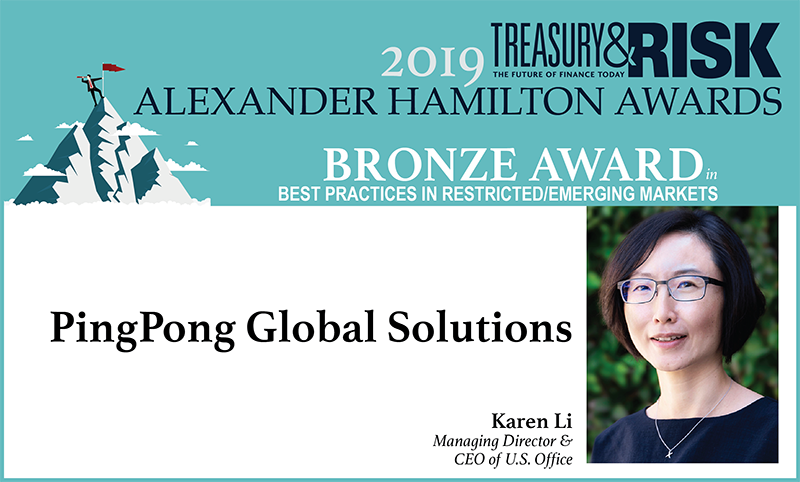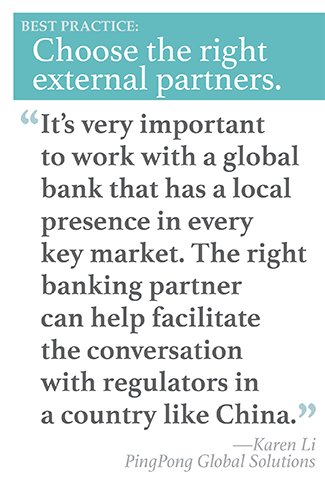
PingPong Global Solutions is a start-up financial services company for the digital economy. Founded in New York City in 2015, the company provides cross-border funds transfers to support global sales via online marketplaces by merchants based in any of 10 countries, including China, India, the United States, Canada, the United Kingdom, and Australia.
"Our core product is a cross-border revenue-collection service for e-commerce merchants," explains Karen Li, managing director/CEO of PingPong's U.S. office. "Online marketplaces that enable third parties to sell on their platform typically collect payment from the consumers, but then pay the third-party sellers in the country and currency where the marketplace is located. We help the sellers collect from foreign marketplaces and repatriate their funds back to their home country."
Li offers the example of a U.S. company selling on Amazon UK: PingPong would help the American business collect what it was owed, in British pounds (GBP), then convert funds into U.S. dollars and bring them back to the United States. PingPong would also give the company the option to retain some of those funds in a GBP-denominated account.
"Our customers tell us how much they want transferred back to their home countries, and we handle those transactions," Li says. "When you think about a U.S. merchant selling in the U.K., they have VAT [value-added tax] to pay locally," Li explains. "They may have other local expenses as well, like advertising, logistics, and shipping. We don't want them to transfer their funds to the U.S. and then pay those expenses from their U.S. account; that would require a double currency exchange. Instead, we give them an account in the U.K. from which they can make their GBP-denominated payments."
 The process is especially complex in markets, like China, that restrict cross-border funds transfers. "When a U.S. company receives payment from a marketplace in China, they also need all the transaction details for regulatory reporting," Li explains. Such information resides in a proprietary enterprise resource planning (ERP) system that PingPong developed in-house. "We store all the data around our customers' transactions in Chinese marketplaces within our ERP, for transaction monitoring as well as regulatory reporting and payment details," Li says.
The process is especially complex in markets, like China, that restrict cross-border funds transfers. "When a U.S. company receives payment from a marketplace in China, they also need all the transaction details for regulatory reporting," Li explains. Such information resides in a proprietary enterprise resource planning (ERP) system that PingPong developed in-house. "We store all the data around our customers' transactions in Chinese marketplaces within our ERP, for transaction monitoring as well as regulatory reporting and payment details," Li says.
To accelerate transactions for customers and increase efficiency internally, PingPong wanted to automate the collection of both funds and information from online marketplaces abroad. The company's banking relationship project managers and payment operations groups began working together on an initiative to pioneer a global account structure that would give each customer a virtual account in each currency and every country where it makes sales.
The first step was to find a global banking partner. "We needed a partner bank that could provide a global banking platform and global team support, as well as strong capabilities from the technical team to support us in creating the automation we wanted," Li explains. "At the same time, we needed solid local capabilities in markets around the world. For example, in the U.S., we needed the ability to handle local ACH payments into and out of the virtual accounts." After evaluating their options, the PingPong team chose to partner with Citibank.
Together, PingPong and Citi developed the global virtual account structure Li's group had in mind. "It's pretty neat," she says. "Within our PingPong bank account, Citi assigns a unique virtual bank account number to each merchant within each market in which they're selling. It works just like a regular bank account," but a virtual account is much easier for small merchants to open in a foreign country. For Li's example of a U.S. merchant wanting to sell in the U.K., she says: "We can offer them an IBAN [International Bank Account Number] that they can just enter into the Amazon UK platform, which enables them to sell within the U.K. The merchant doesn't have to travel to the U.K. to make this happen; the process of opening virtual accounts is very streamlined within our system."
Once a merchant is set up in the system, its staff can use PingPong's online platform to manage the amount of money in each of its virtual accounts, and to transfer money among them or make payments or withdrawals. "When customers log in, they see the balance and currency of each virtual bank account we've assigned them," Li says. "They can initiate transactions, convert currencies, make payments, or withdraw funds."
The platform makes its current foreign exchange (FX) rates clear. "Currency rates are transparent," Li says. "The merchants know exactly what they'll get in terms of foreign exchange, and they have better control of when and exactly what amounts each transaction will be."
See also:
- Partnership Breeds Innovation in Funds Transfers out of India
- Automating Cash Visibility in Emerging Markets
PingPong's ERP system connects to Citi's banking platform through an application programming interface (API). Data flows for payments processing, remittance details, and regulatory reporting information are fully automated. Because PingPong has removed much of the friction from cross-border transactions it handles, it can process most payments much faster now than in the past. Transactions that used to take 24 hours within certain markets now take only an hour or two. "We've made significant progress in helping merchants get their money faster," Li says.
Navigating the rules for moving money into China is an ongoing challenge. "Over the four years that we've been operating, the regulations around FX and reporting for e-commerce merchants have changed multiple times," Li says. "We have worked hard to build and maintain good relationships with the People's Bank of China [PBOC] and State Administration of Foreign Exchange [SAFE]. Our compliance team is very proactive in staying ahead of any upcoming changes, making sure the PBOC and SAFE are aware of exactly how our product works, and then submitting the documents required to keep our customers compliant."
She credits Citi with helping PingPong build these relationships. "I think the biggest lesson we've learned from this process is that it's very important to work with a global bank that has a local presence in every key market," Li says. "The right banking partner can help facilitate the conversation with regulators in a country like China."
© Touchpoint Markets, All Rights Reserved. Request academic re-use from www.copyright.com. All other uses, submit a request to [email protected]. For more inforrmation visit Asset & Logo Licensing.


